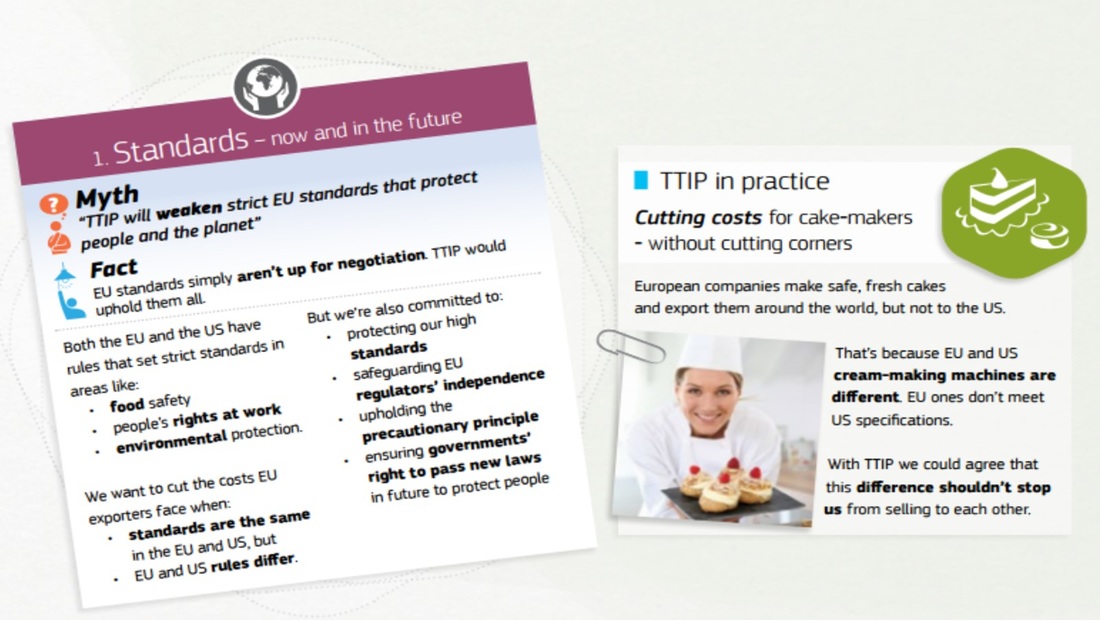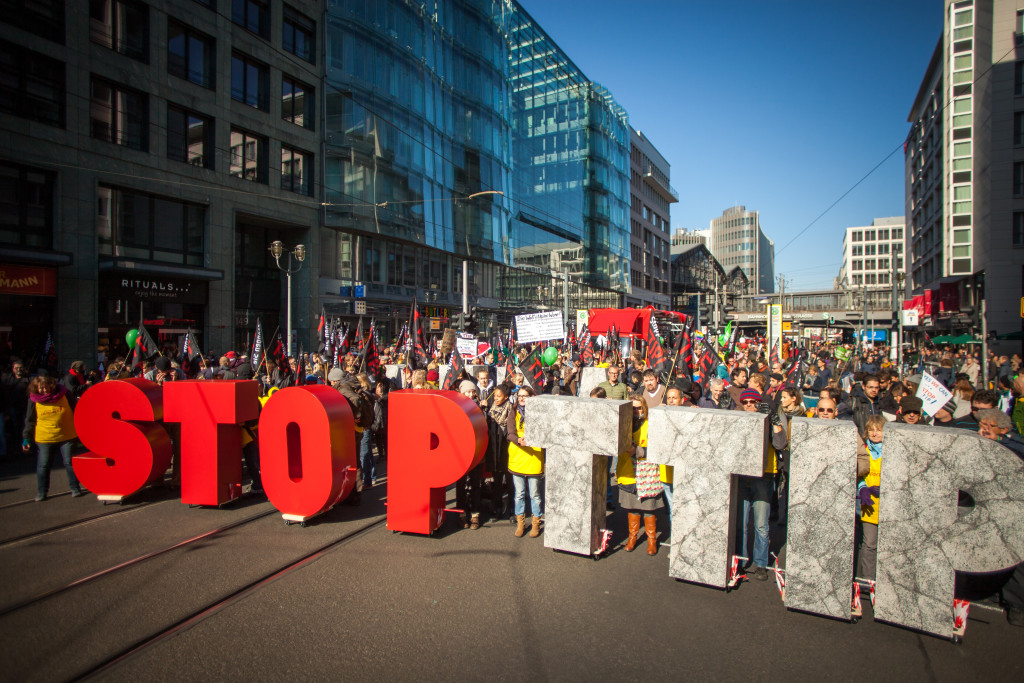|
Happy St. Patrick's day! This is the first post of my newest blogging effort: The Verdant Yank - Find out why I'm labeling myself with this outlandish title here.
|
No time to read? Watch my quirky v-log version on TTIP: Cream cakes and a flat earth |
|
The Good, The Bad, & The Ugly on TTIP
"Just promise me you'll keep an open mind"
What is TTIP?
|
It’s hard to find much good news in the media about TTIP, but the TTIP negotiators themselves point to a number of benefits if the trade agreement is passed. They say:
|
the agreement would be of “great geostrategic and geo-economic value in terms of strengthening Transatlantic ties and enhancing our ability to define a global rules-based architecture” and this will “promote economic growth, liberalism and democracy globally”.
- Increased investment and employment in both the US and EU
- Further reduction or complete elimination of Transatlantic trade tariffs
- Closer regulatory cooperation to reduce cost and burden for export companies, particularly small and medium enterprises (SMEs) who struggle to engage in Transatlantic trade due to lack of resources.
|
And it’s not just professional groups who are concerned. -I’ve never seen so many young people follow and fight a trade negotiation either. That may sound like a bad thing, but to me, this is evidence of a renewed interest and mobilisation for social change. Maybe TTIP really is a vehicle to promote democracy, but not in the way negotiators presume.
|
- Encouragement of mass imports of key agricultural products from USA to Europe, further burdening European agricultural competitiveness. This is a particular concern for the Irish beef and dairy industries.
- Potential to soften US banking regulations and give too much power to banks, particularly in the US which had tightened up banking regulations in recent years.
- Potential to cause “considerable levels of joblessness” in Europe.
- TTIP prevents cooperation with Russia and could even inflict economic war on Russia via a common Euro-Atlantic economic region
- Driven by the weak Euro, TTIP could increase the ability of U.S. companies to take-over European companies (e.g. GM taking over VW).
And here are some of the bigger, badder issues TTIP concerns:
After reading the draft text, German MEP Katja Kipping claimed TTIP had “secrecy written all over it” and “without a legal commentary, [MEPs] are still in the dark as to the potential impacts of many of the terms used.”
It’s not surprising that trade agreements of the past were not aired in public given the technology available at the time, but we live online now so there’s no excuse for negotiators not to publish draft text for everyone to see, particularly if this agreement benefits Americans and Europeans as much as they claim it does. TTIP negotiators could take a hint from the UN climate negotiations and their virtual participation via the publically available Negotiator app if they need evidence that transparency is easy to achieve in this day and age.
Proponents say TTIP is not about harmonizing to the lowest common denominator (downward harmonization) but aligning regulatory processes where it benefits both businesses and consumers (crème cakes!), but consider products where the US and Europe have differed significantly, such as gun sales, chemicals, and smoking regulations. - The jury is still out on how regulatory convergence would impact such issues.
Even if we believe negotiators when they say ‘downward harmonization’ of regulations won’t take place, the EUs higher regulatory standards generally results in more expensive products and those more expensive products won’t be able to compete with cheaper U.S. imports subject to lower standards. U.S. chlorinated chicken is a prime example of this kind of risk. -With or without regulatory convergence, we can expect to be eating it here in Europe if TTIP has its way.
The ISDS (or the newly proposed ‘Investor Court System’) is one of the most contentious aspects of TTIP. As economist Joseph Stiglitz points out, the ISDS would mean “every time you passed a regulation against asbestos or anything else, you would be sued…You can write the regulation. You would just have to keep writing a check to Philip Morris to make up for the profits that they would have had if they were able to kill people like they were able to in the past.”
Since TTIP text is not available for public analysis every argument (both for and against) is hypothetical, but at least we can look at past trade agreements to evaluate the merit of the ISDS:
- Corporations have used ISDS to challenge governments over 600 times, and many of these challenges are clearly related to health or environmental decisions by governments.
- United Nations figures reveal American firms have sued states on 130 separate occasions under free-trade agreements since the year 2000.
-
Just to name a few examples:
- Phillip Morris sued Australia and Uruguay for placing health warnings on cigarette packets. Although the challenge failed, the Australian government spent an estimated A$50m of taxpayers’ money defending their 2011 law.
- Under the North American Free Trade Agreement (NAFTA), a US investor tried to open a toxic waste dump in Mexico. While the Mexican federal and state governments had approved it, the city government refused to give them a permit. The investor sued and won a judgment against Mexico for cutting into the profits he expected he would get by opening this toxic waste dump. Mexico had to pay the investor $16 million so that a city could control its own zoning.
- Under existing treaties, a Swedish electric utility owning power plants in Germany has sued Germany twice. In the first case, German had to roll back on environmental regulations at the company’s request. In the second case (pending), the utility wants compensation for Germany's response to the Fukushima disaster to shut down their nuclear plants.
- In 2010, the United States challenged one of China’s wind power subsidy programs on the grounds that it contained supports for local industry that were considered protectionist.
- Recently, TransCanada announced it was suing the US government for $15bn after the Obama administration rejected the Keystone XL pipeline to pump oil from the tar sands of Canada on environmental grounds.
- Canada is facing $2.6 billion in challenges from American corporations under NAFTA, including challenges on bans against environmental harmful additives to gasoline, exports of hazardous PCBs and lawn pesticides, and moratoriums on fracking.
And what of the climate?
This is already starting to happen. -In 2012, the U.S. oil company Lone Pine used NAFTA to challenge Quebec’s fracking moratorium. The European Union’s trade commissioner has already told ExxonMobil that TTIP would help remove obstacles to fossil fuel development in Africa and South America when we know we need to get off fossil fuels right now to slow down climate change. In addition, Governments that are already weak on climate action (e.g. Ireland) may cave to corporate pressure so as not to appear anti-trade and argue their hands are tied on climate action rather than take the necessary steps to reduce greenhouse gas emissions in line with the Paris Climate Agreement. Remember that the Paris Agreement isn’t legally binding but TTIP is, so it’s a no-brainer where governments are going to focus most of their risk-averse behaviours.
TTIP - wrapping up the Bad
“I read nothing to alleviate my concern that the US side wishes to make life more difficult for public and community enterprises and to secure better terms for transnational corporations in the battle for public tenders. I also read nothing to calm my fears that EU negotiators are prepared to sacrifice our social and environmental standards for the prospect of winning lucrative contracts for big European firms. I read nothing that would lead me to reconsider my previous criticism that consumer protection plays no part in TTIP other than to proclaim free market competition to be the highest form of consumer protection that exists.”
 Photo: Darvell and Sons
Photo: Darvell and Sons
You can think about the cream cakes and how TTIP would open up a market for such deliciousness, or you can be like Katja -concerned about the risks that TTIP poses in all other aspects of our life.
The “ugly” bits are issues that can’t be fixed by TTIP and look more generally at who benefits from free trade agreements:
Instead, what we create with FTAs is a race to the bottom of the labour market. Thomas Friedman calls it a “flat earth,” or a flat labour market, with uniformly low production costs aspiring for full globalization. This means that workers in FTA countries will eventually all make the same wage as we reach some kind of global mean, where workers in high-wage countries (e.g. Ireland) drop down to lower wages in line with the other partner countries. This is ideal for multi-national corporations, but is this what we want for the citizens of Europe or America? Do we want a complete interdependence of the European and US economies in an era when we know that diversity is a safer bet?
Economist Frank Ackermann reminds us there is no huge barrier to trade between the US and Europe right now. -Goods flow back and forth all the time and most tariffs are less than 3% in either direction. Rather, TTIP appears to be “a solution looking for a problem” or simply an opportunity for corporations to roll back the rules that the US or Europe has adopted. Worse still, we won’t comprehend its full consequences until 20-30 years into the agreement. Case and point, NAFTA...
This week, Rep. Louise Slaughter (D) of New York stated:
“I have never seen a trade agreement that benefited the American manufacturer or American worker. We were decimated by NAFTA and have lost tens of thousands of manufacturing jobs in my area since it went into effect, culminating in one of the highest poverty rates in the country…The destruction wreaked by NAFTA can be seen in thousands of hollowed out towns across the United States, if you trust the bridges to get you there and are willing to risk drinking the water.”
Maybe Bernie Sanders put it best when he said of America’s trade policies:
“The decimation of Detroit, Flint and communities all over this country did not happen by accident. It is a direct result of disastrous trade deals that have allowed corporations to ship our jobs to low-wage countries…Not only has our trade policy cost us millions of decent paying jobs, it has led to a race to the bottom. American workers are forced to compete against desperate workers abroad who make pennies an hour.”
|
Does Ireland really want to race to the bottom of TTIP and become the next Detroit? Enda Kenny seems to think so, but do the rest of us?
|
Enda Kenny "We're very big supporters of T-TIP" |
I tried to give those who support TTIP the benefit of the doubt and assume they were all trying to “do the right thing”. I wanted to see TTIP as nothing more than an effort to reach across the pond to boost our mutual economies, but even if you fixed all the bad bits detailed above, you’d still be left with the overall ethos of free trade that prioritises corporations’ well-being over citizens’. No one seems to have learned anything from the mistakes of NAFTA, and until they do I’m calling bull on this kind of “trickle down” free trade mentality.
For TTIP to gain any public support, negotiators need to tackle the most glaring “bad bits” immediately (rather than leaving them until the end as they plan to) and our governments need to revisit the whole concept of FTAs in general. Globally-traded cream cakes may be great, but who wants to live on a flat earth?
|
If you want to get more involved in TTIP, check out the great work that Friends of the Earth and many other NGOs are doing right now.
Happy St. Patrick's day and thanks for reading my first 'Verdant Yank' blog post. Keep fighting the good fight! -Cara |








 RSS Feed
RSS Feed
